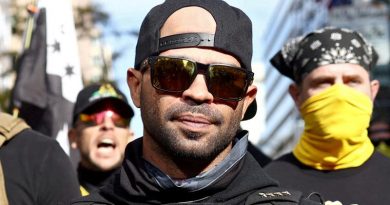Tunisia's main party holds street protest, escalating government row
TUNIS (Reuters) – Tunisia’s biggest political party rallied an immense crowd of supporters in the capital on Saturday in a show of strength that could fuel a dispute between the president and prime minister that has paralysed the government.
In one of the biggest demonstrations in Tunisia since the 2011 revolution, tens of thousands of party faithful marched through central Tunis chanting “the people want to protect institutions” and “the people want national unity”.
The moderate Islamist party Ennahda, led by Parliament Speaker Rached Ghannouchi, has backed Prime Minister Hichem Mechichi in his standoff with President Kais Saied over a cabinet reshuffle.
“We are telling Saied we are not ready to lose the democratic process,” said one protester, Ahmed Ben Ali.
The dispute has brought to a head months of wrangling between the three men in Tunisia’s latest political crisis since a 2019 election delivered a fragmented parliament while propelling Saied, an independent, to the presidency.
It has played out against a grim backdrop of economic anxiety, angry protests, widespread disillusionment with democracy and competing reform demands from foreign lenders and the powerful labour union as sovereign debt repayments loom.
Saied nominated Mechichi as prime minister last summer when the government collapsed after only five months in office, but the two men soon fell out.
Mechichi then turned for support to the two biggest parties in parliament – Ennahda and jailed media mogul Nabil Karoui’s Heart of Tunisia.
Last month, Mechichi changed 11 ministers in a reshuffle seen as replacing allies of Saied with those of Ennahda and Heart of Tunisia. The president has refused to swear four of them in, however, saying they had conflicts of interest.
Meanwhile, during protests last month over inequality and police abuses, demonstrators focused most of their anger against Mechichi and Ennahda.
Ennahda billed Saturday’s march as “in support of democracy”, but it was widely seen as an effort to mobilise popular backing against Saied – raising the spectre of competing protest movements that could lead to polarisation or violence.
“This is a strong message that all the people want dialogue and national unity,” Fethi Ayadi, a senior Ennahda official, told Reuters as people waved national and party flags.
Tunisia’s 2021 budget forecasts borrowing needs of 19.5 billion Tunisian dinars ($7.2 billion), including about $5 billion in foreign loans.
The country’s credit rating has fallen since the coronavirus pandemic began and Tunisian credit default swaps – insurance against sovereign debt defaults – have soared in recent weeks, showing market concerns about its ability to raise funds.
However, demands by foreign lenders for long-term cuts in current spending are opposed by the powerful labour union and could lead to painful reductions in state programmes that might further destabilise the government.
Source: Read Full Article

